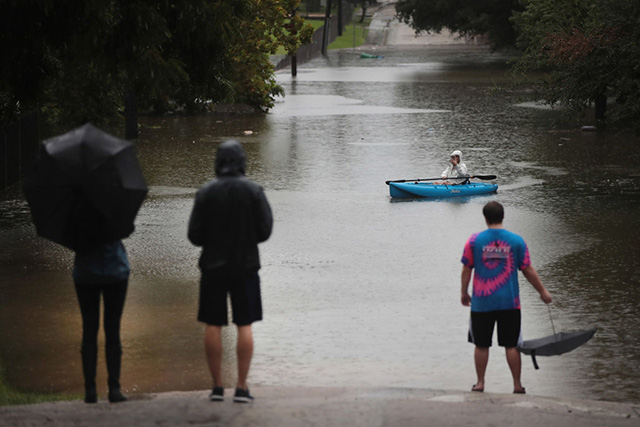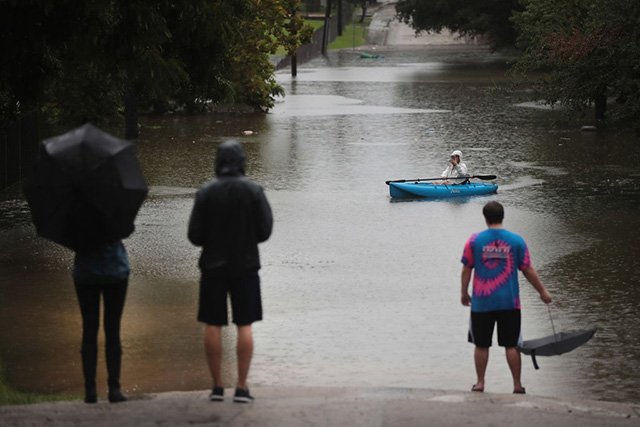
 Residents navigate a flooded street that has been inundated with water from Hurricane Harvey on August 27, 2017, in Houston, Texas. Harvey, which made landfall north of Corpus Christi late Friday evening, is expected to dump upwards of 40 inches of rain in areas of Texas over the next couple of days. (Photo: Scott Olson / Getty Images)
Residents navigate a flooded street that has been inundated with water from Hurricane Harvey on August 27, 2017, in Houston, Texas. Harvey, which made landfall north of Corpus Christi late Friday evening, is expected to dump upwards of 40 inches of rain in areas of Texas over the next couple of days. (Photo: Scott Olson / Getty Images)
My mother and father live just north of Houston. Here is the rather cryptic text message my mother, sent me late Sunday night:
Lost power. Got generator running, fridge on, light, running small AC in morning. Tired. Staying upstairs to escape generator noise.
Trees down. Wind up. Waiting for daylight to use chainsaws. Front entrance flooded.
We are okay. Tired.
Love you,
Mom
Tropical Storm Harvey, which made landfall near Corpus Christi last Friday as a Category 4 hurricane, has stalled over south-central Texas and has been dumping record levels of rain on this population-dense area. The area flooded in Texas, as of Sunday, was, staggeringly, the size of Lake Michigan. At the time of this writing, 450,000 Texans were expected to seek disaster aid.
To see more stories like this, visit “Planet or Profit?”
Meteorologist Eric Holthaus tweeted last week, “Since the 1950s, Houston has seen a 167% increase in heavy downpours. #Harvey could bring the worst one yet.”
Unfortunately for the people of south Texas, Holthaus was spot on. More than 30 inches of rain have fallen, with an additional 15-25 inches expected in the coming days.
At least five people have died from the storm, and that number is expected to rise. More than 150 major roads in Houston alone are now rivers.
Houston is the fourth largest city in the US, with 6.8 million people in its metro area, and is the petrochemical and refinery hub of the country. It is anyone’s guess how long it will take the city to rebuild and recover.
What made Harvey so brutal? Scientific studies have shown for quite some time that Anthropogenic Climate Disruption (ACD) amplifies the impacts of hurricanes by causing them to have larger storm surges, higher wind speeds and greater rainfall amounts. All of these are driven by the amount of heat in the oceans.
According to a study by Ars Technica, this past winter, for the first time on record, water temperatures in the Gulf of Mexico never fell below 73°F. These conditions set the stage for what we are witnessing now: Warming waters intensify the strength and impacts of tropical storms and hurricanes, as previous studies have shown. Additionally, the water temperatures in the Gulf of Mexico this summer have been exceedingly warm, creating the prime conditions for a storm like Harvey. ACD is amping up hurricanes.
Now, Harvey will be another name added to the list of other deadly ACD-amplified hurricanes, like Katrina, Ike and Sandy, which have caused record-setting levels of devastation in the US.
“Fuel for the Storm”
In more ways than one, Harvey has been unprecedented, and that is due to ACD’s impacts on the conditions for the storm.
Sea-surface temperatures near Texas were between 2.7° and 7.2°F above average, making them some of the warmest ocean temperatures on Earth. This caused Harvey to ramp up from a tropical depression to a catastrophic Category 4 hurricane in merely two days’ time.
“This is the main fuel for the storm,” Kevin Trenberth, a senior scientist at the US National Center for Atmospheric Research told The Atlantic. “Although these storms occur naturally, the storm is apt to be more intense, maybe a bit bigger, longer-lasting, and with much heavier rainfalls [because of that ocean heat].”
Trenberth also told The Atlantic, “The human contribution can be up to 30 percent or so of the total rainfall coming out of the storm. It may have been a strong storm, and it may have caused a lot of problems anyway — but [human-caused climate change] amplifies the damage considerably.”
Trenberth is the author of a 2011 study titled, “Changes in precipitation with climate change,” which shows how the water-holding capacity of air increases 7 percent for every 1°C warming, which naturally leads to an increase in the atmosphere’s ability to hold water, and sets the conditions for epic rain events like Texas is experiencing today.
“Epic and Catastrophic Flooding”
Late Sunday the National Weather Service announced “epic and catastrophic flooding” had occurred in and around Houston and Galveston, and that the flooding could worsen with additional expected rainfall.
In 2001, Tropical Storm Allison was the worst rainstorm to strike a city in the US in modern history. It caused a deluge in Houston, which left 30,000 homeless, killed 23 in Texas as a whole, and caused severe damage to hospitals and other buildings in downtown Houston.
Harvey may well exceed these records, if rainfall continues as predicted.
Scientists are already warning that the storm is going to cause the most devastating flooding the city has ever seen.
“The economic impact should be greater than any other flood event we’ve ever experienced,” Sam Brody, a scientist at Texas A&M University in Galveston who specializes in natural hazards mitigation, told the Texas Tribune. “And it’s going to take years for these residential communities to recover.”
Harvey is unique in another way as well. According to Stephanie Zick, who is studying tropical cyclones at Virginia Tech University, Harvey is the only storm on record in the Gulf of Mexico to have ever intensified in the 12 hours prior to making landfall.
Given that warming of both the atmosphere and oceans is only going to continue to escalate, a text I received Sunday from a good friend of mine who lives near downtown Houston captured what Harvey portends:
It will take years to recover.
We are all rescuing each other.
Odd to think that our future can be summed up like that.
Truthout Is Preparing to Meet Trump’s Agenda With Resistance at Every Turn
Dear Truthout Community,
If you feel rage, despondency, confusion and deep fear today, you are not alone. We’re feeling it too. We are heartsick. Facing down Trump’s fascist agenda, we are desperately worried about the most vulnerable people among us, including our loved ones and everyone in the Truthout community, and our minds are racing a million miles a minute to try to map out all that needs to be done.
We must give ourselves space to grieve and feel our fear, feel our rage, and keep in the forefront of our mind the stark truth that millions of real human lives are on the line. And simultaneously, we’ve got to get to work, take stock of our resources, and prepare to throw ourselves full force into the movement.
Journalism is a linchpin of that movement. Even as we are reeling, we’re summoning up all the energy we can to face down what’s coming, because we know that one of the sharpest weapons against fascism is publishing the truth.
There are many terrifying planks to the Trump agenda, and we plan to devote ourselves to reporting thoroughly on each one and, crucially, covering the movements resisting them. We also recognize that Trump is a dire threat to journalism itself, and that we must take this seriously from the outset.
After the election, the four of us sat down to have some hard but necessary conversations about Truthout under a Trump presidency. How would we defend our publication from an avalanche of far right lawsuits that seek to bankrupt us? How would we keep our reporters safe if they need to cover outbreaks of political violence, or if they are targeted by authorities? How will we urgently produce the practical analysis, tools and movement coverage that you need right now — breaking through our normal routines to meet a terrifying moment in ways that best serve you?
It will be a tough, scary four years to produce social justice-driven journalism. We need to deliver news, strategy, liberatory ideas, tools and movement-sparking solutions with a force that we never have had to before. And at the same time, we desperately need to protect our ability to do so.
We know this is such a painful moment and donations may understandably be the last thing on your mind. But we must ask for your support, which is needed in a new and urgent way.
We promise we will kick into an even higher gear to give you truthful news that cuts against the disinformation and vitriol and hate and violence. We promise to publish analyses that will serve the needs of the movements we all rely on to survive the next four years, and even build for the future. We promise to be responsive, to recognize you as members of our community with a vital stake and voice in this work.
Please dig deep if you can, but a donation of any amount will be a truly meaningful and tangible action in this cataclysmic historical moment.
We’re with you. Let’s do all we can to move forward together.
With love, rage, and solidarity,
Maya, Negin, Saima, and Ziggy